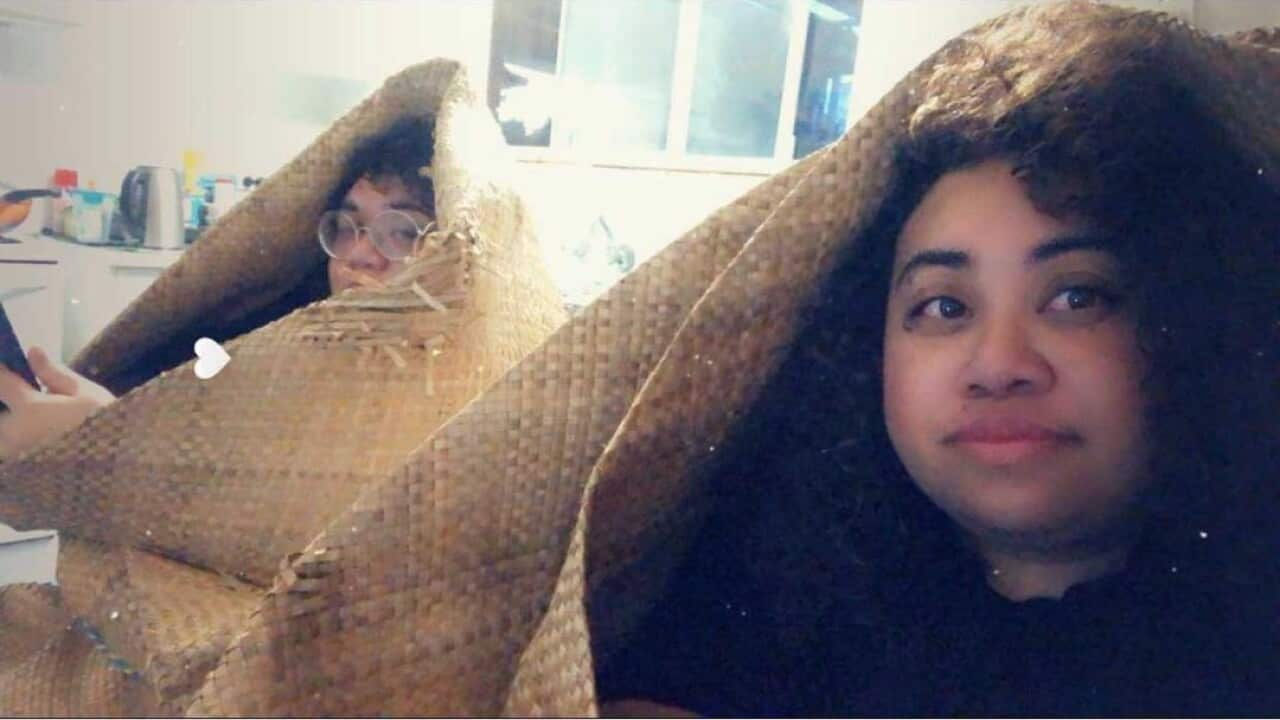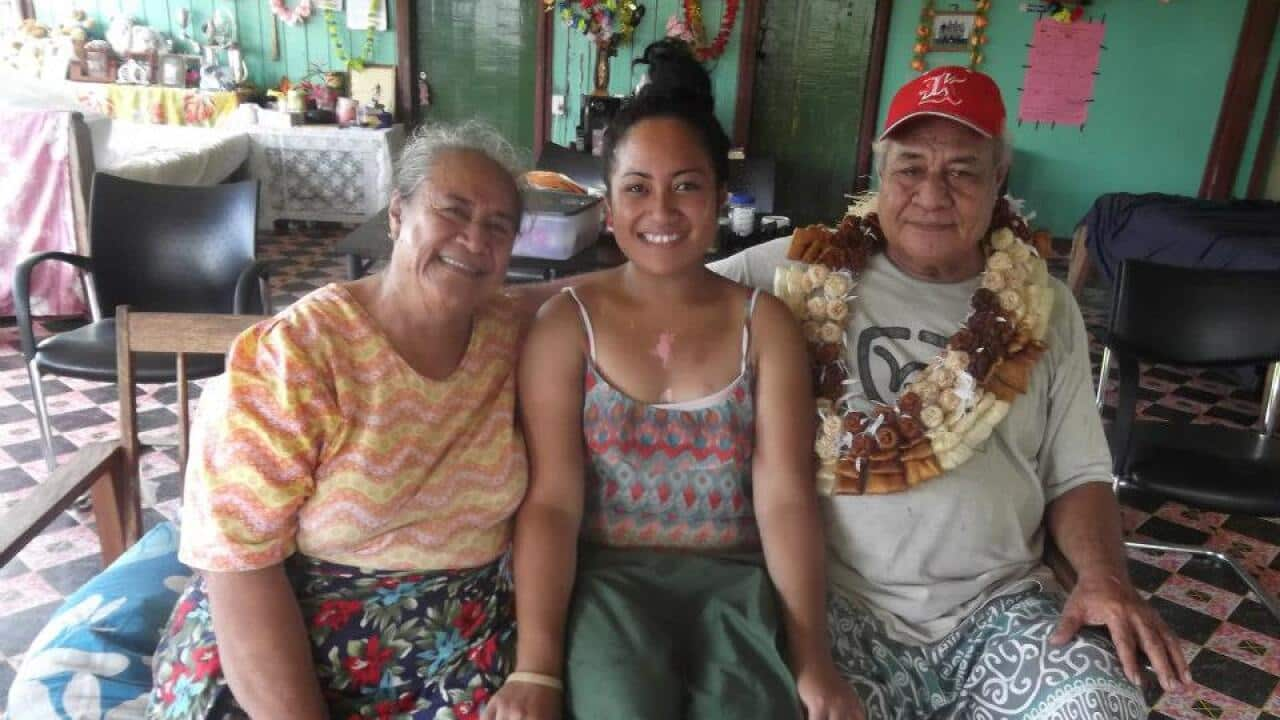Ensuring we weren’t late, my sister nervously types in the Zoom meeting code as I rattle it off from the screenshot I have of a Facebook post. The browser morphs into a loading screen before opening up to a familiar face; withdrawn and pale. Our cousin’s voice is shaky as she briefly speaks, the view rocking slightly as she adjusts the laptop to her liking before backing away to reveal the rest of the family. On our side, we finally take off the sticker covering our laptop’s camera to join the other pixelated faces just as the himi starts. The family prayer had begun.
This was our reality for a cold week in July 2020 during a nationwide lockdown, which has come full circle with yet another July lockdown this year. It was not my first funeral and it will not be the last; an unsaid truth that I have to accept being part of a big extended family, especially being Tongan.
From the outside, Tongan funerals seem to be these big and elaborate affairs that take up so much more time, resources and collaboration than Western-style funerals. Such as when my own dad passed away in 2013, traditional proceedings for his funeral began the moment the doctor informed us that he was gone. Having to put our grief on hold, we had to call and inform the ‘Ulumotu’aor the head of the family so that the formal announcement of Dad’s passing could be shared with the rest of the family. From there, it was a flurry of activity as we contacted other key figures needed during the funeral and held meetings with family members to discuss the upcoming week. And even when things were decided on, there was no time to process anything since the next night heralded the arrival of guests bringing their hala in the form of fine mats or food to the house as a way to pay their respects. It was these daily evening prayers that proved so cathartic to me. Welcoming close friends and family into the house, sitting close with them as we prayed together, singing himis, hearing their stories about my dad and reminiscing together. Even on the night before the burial or the ‘Apo, there were people who wiped away my tears with crumpled tissues even as I broke down in the church. Feeling no judgement as I kissed my father’s face goodbye multiple times during that night-long vigil. There was only warmth as encompassing as the drooping ta'ovala I was tied in to. The outpouring of ‘ofa, of love, as real and tangible as the white plastic plates packed with steaming puaka, lu sipi and kumala and the cup of hot black tea that accompanied it.
It was these daily evening prayers that proved so cathartic to me. Welcoming close friends and family into the house, sitting close with them as we prayed together, singing himis, hearing their stories about my dad and reminiscing together. Even on the night before the burial or the ‘Apo, there were people who wiped away my tears with crumpled tissues even as I broke down in the church. Feeling no judgement as I kissed my father’s face goodbye multiple times during that night-long vigil. There was only warmth as encompassing as the drooping ta'ovala I was tied in to. The outpouring of ‘ofa, of love, as real and tangible as the white plastic plates packed with steaming puaka, lu sipi and kumala and the cup of hot black tea that accompanied it.

Source: Supplied
Welcoming close friends and family into the house, sitting close with them as we prayed together, singing himis, hearing their stories about my dad and reminiscing together
Facing my uncle’s funeral with the memories of his brother’s funeral, it was akin to replacing a roaring fireplace with an LCD imitation. And it wasn’t just the physical distance that tore at my heart when I heard the news. It was that, in a cultural sense, my siblings and I are my dad‘s representatives and we inherit the unspoken responsibilities he had as a younger male sibling. And in Tongan tradition, where the eldest siblings would be seen as the head; making decisions and being the voices of the family. The younger siblings are the hands and feet; lending silent support and assistance. Willing to clean, be in the kitchens or running errands. What needs to be done, will be carried out by them. That’s their fatongia or duty that is done out of love.
Being in lockdown, my sister and I couldn’t accept that there was nothing we could do so we had to adapt and think outside the box when it came to doing our fatongia. We decided on sending something in our place by using our knowledge of technology and social media. Hunting down a local florist that met our standards and being able to send sympathy flowers that arrived the next day. As well as buying dinner and having it delivered to the house for the first night because we knew that it was the last thing on their minds.
Alongside these material items, keeping in contact with our cousins was paramount to me and my sister throughout the funeral. As the eldest siblings, it would have fallen on us to provide assistance if we were there so we reconnected via Facebook Messenger and the numerous conversations we had (and still have) reduced me to tears many times because of how vulnerable we let ourselves be. And perhaps that’s what surprised me the most, the level of intimacy that could still be achieved. Despite the limitations in place, despite the stress over international purchases and knowing things could go wrong or be late. I may have had to sit in my kitchen at 4am to watch through a screen as my beloved uncle was buried but I also felt as present at that funeral as the vibrant wreaths that arrived; the attached personalised messages fluttering as if moved by our very breath.
And perhaps that’s what surprised me the most, the level of intimacy that could still be achieved. Despite the limitations in place, despite the stress over international purchases and knowing things could go wrong or be late. I may have had to sit in my kitchen at 4am to watch through a screen as my beloved uncle was buried but I also felt as present at that funeral as the vibrant wreaths that arrived; the attached personalised messages fluttering as if moved by our very breath.

Source: Supplied
This mentality mirrors that of this younger generation of Tongans that has grown with the presence of ever changing technology. We don’t allow it to hinder us. We form connections & relationships in unison with it, seen with the increased usage of Zoom or going live on Facebook or Instagram. ‘Ofais as adaptable as we are and regardless of the circumstances in life, we must be open to change with it.
Jay Tama is a Tongan freelance writer and poet who resides in the Mount Druitt area. Their poetry has been featured in Talanoa’s Recycle Zine and they are currently developing their skills as a writer for future projects.
This article is part of SBS Voices' Straight Up Islander series, showcasing the work of writers with ancestral ties across Oceania. It has been edited by Winnie Dunn, in partnership with Sweatshop Literacy Movement Inc.

A commissioned illustration for the SBS Voices 'Straight Up Islander' collection by artist Tori-Jay Mordey. Source: Tori-Jay Mordey





